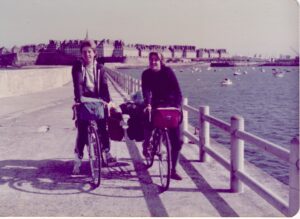
In the Fall of 1981, two 23-year old girlfriends, recent graduates of UC Berkeley, embarked upon a six-week bicycle tour of England, France, Germany, Italy, Switzerland. Their curiously strong adventures began immediately.
Spokes, Saddles and Cranks
Memoir, enhanced and retold by J.Macon King
from the tales, travel journals and postcards of Carolyn Adams and Perry McKleroy King
Looming above, the full Harvest Moon leers at the shenanigans he’s pulling on us. Perry and I just flopped into a shared bed in this centuries-old stone oast house with a high pointed roof, which looks like a giant gnome’s cap during the day and a witch’s hat at night. Occasional wafts of kiln-dried hops may be real, or imagined.
We are sitting against the rickety headboard of the narrowest and saggiest bed that I have ever crossed. Above us is an ancient, stuccoed-ceiling, half-timbered roof and a beam with a carved date: “1478.” Ancient indeed. I hope the roof does not leak.
Deep within South of England countryside we have respited between rain storms, on a thoroughbred stud farm, complete with eighteen geese, three black cats, two dogs, a strange, handsome gentleman, and one loudmouthed cock.
This is only day three of our Euro bicycle trip and Perry and I have had some sort of bizarre escapades already. Sleeping in a converted English hop-drying brewery on a horse ranch cum stud farm sounds picturesque, doesn’t it? Wait until you hear how we got here…
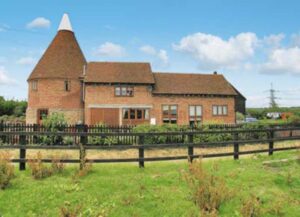
It’s not baggage, it’s luggage
Our mechanical, and ways and meanies, episodes started Day 1. At Heathrow, the cab driver who picked us up was a frail 83-year-old man, with benign wit, who looked much like an aged Queen Elizabeth. He jammed our shipping-boxed bikes, in his classic London cab’s boot, affably shooing off our help. On Charing Cross Station platform, we assembled our bikes, readying them to load on our soon-departing train. Perry firmly wrenched both cranks on her black Puch. Amidst our jet-lagged haste, and distracting comments from men as we leaned over our bikes, Perry mounted her cranks parallel, instead of at 180 degrees—as if she would be rowing her pedals like oars on a rowboat. Hilarious except we ran out of time attempting to reverse the reverse threads. Passengers were already boarded, and with just moments to spare, we climbed up with bikes as is, and rolled them into the train’s baggage car. Whew.
“Stop! No, no! No bicycles,” the white-bearded conductor commanded. He pulled Perry’s bike out.
We protested loudly, me waving the travel brochure that said “Bicycles OK!” Perry pushed her bike back in. The conductor pulled it out. “Bicycles are not baggage,” he said.
The passengers began peering out of their seats. “You’re right,” Perry said. Perry pushed her bike back in. “It’s not baggage. It’s luggage.”
Passengers snickered. The conductor glared at the passengers. He tried to roll her bike back out, banging his shin on the unexpectedly misaligned pedal. He glared at the deformed bike and glared at Perry.
Perry stood her ground. “We have a most urgent appointment, Captain sir…”
“A conductor is not a captain, he’s a conductor,” the man smirked, thinking himself clever.
Perry indicated his impressive brass-buttoned, black uniform. “Then tell me, good sir, why do you wear a uniform that presents you as the captain of the Titanic?”
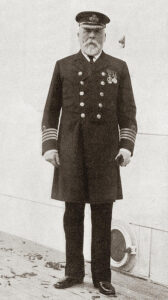
The conductor actually looked down at his uniform, turned red and sputtered. Some passengers burst out laughing.
“As I was saying, sir,” Perry pressed. “A most urgent appointment to which we must post haste these bicycles. To Hastings. A deadline with persons of import, which, um who, must not be breached. Or trifled. With.”
“Whom?” he demanded.
Oh, crap. I thought. Really, Perry? Post hasting to Hastings?
Perry paused, held up a finger, motioned to him and whispered in his fuzzy ear.
His eyes widened, as he uttered, “Wh-a-aa-at?” The English really can polysyllable out a syllable with mouth open discomfortingly long. I couldn’t resist peeking inside his mouth just to check if the hygiene rumors…
He took off his captain’s cap, noted Perry’s Princess-Di-ish-short, blonde hair (married to Prince Charles just weeks ago!), as she posed regally. He scratched his head, nodding. “Royals,” she had whispered. She had pulled it off!
Then, he looked at me. I suddenly felt frumpy. More dowdy, less Diana. I froze like a deer poacher in the Queen’s forest. He actually said, “Bah!” as he snapped his hat back on. He snorted, squeezing his way around, picked up MY blue Fuji, took it down the steps and placed it on the platform. When he returned, Perry had buried her bike deep in the baggage car. He “harrumphed,” plunged in, plucked it up and carried it out. We followed.
A few passengers slid open their windows and yelled, “Captain, let ‘em on.” A few yelled, “You girls there, stop holding up the train.” It turned into a big scene. The conductor was adamant, and proclaimed, “All aboard.” He sneered. “Except bicycles.”
Some passengers booed. Perry said to me, “It’s OK, Carolyn,” winked, and nudged me up the steps. We just left our poor bikes right on the platform and got on.
Right after the whistle, Perry courageously jumped off the train, lifted each bike up, handed them up to me, and jumped in. She barely got back on when the doors shut and the train started moving. We rolled our bikes into the baggage car and Perry cable-locked them to a shelf. By the time the conductor came back, that train had already left the station. He was mad, but some passengers spoke up for us: “Com’on, mate, they’re just gurls.” or “Leave ‘em be. They’re Americans. They don’t know what’s what.” The Captain sighed and moved on.
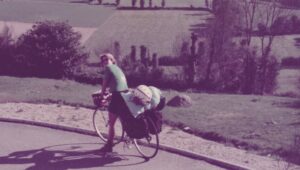
Intense intent in tent
After that train trip, we pedaled off for a long ride, Perry, still troubled by her righted crank. Nonetheless, we headed to the East Sussex town of Rye, which we read was “a quaint, castled, medieval small town, larger than a village.” There we stayed at friends of friend’s cute little home. A perfectly British jam and marmalade factory was run from their “cottage industry.” Due to lack of space we pitched our humble brown tent in their back garden. For dinner there was no skimping on wine though the food was less than desirable: “supper” was burnt chicken and crispy sausage which scalded my mouth, with the ubiquitous chips. The Campbells were lovely, their jams yummy, but their young boys were horrors. They called us “booby monsters,” apparently never having been in close proximity to young women before, and teased us constantly.
The next morning, both of us still feeling gastro-questionable from the dinner, we made a gentle tour of ye olde Rye, before peddling away. We ended up in a tiny village where we asked around for a spot to camp. A shop proprietor suggested a park down the way. We rolled in, pitched our pup tent, ate, and exhausted, got into our jammies and our bags. Sipping from our little curvy bottle of Grand Marnier, we played chess on our miniature magnetic set. I won, I must admit, taking under consideration that Perry did nod off a couple of times waiting for my near-brilliant moves. We wrote in our journals until we fell asleep.
Ow! A snake bit me. Actually, it was Perry digging in her well-chewed nails into my arm. I heard rustling. A moonlit shadow fell over our tent.
“I love you,” a young male voice murmured.
I held my flashlight ready. Perry opened the largest blade on her Swiss Army knife. She demanded, “What are you doing here?”
“I am dreaming.”
Perry changed her voice to a deep, masculine voice and said brusquely, “Go dream someplace else!”
The shadowy figure hurried away. We waited a few moments to be sure and peeked out, Nobody. We quickly discussed our options: 1. Jump on our bikes in our jammies and blaze to an inn in town. 2. Stay put and be raped and murdered. Or vice versa. 3. Stay put and stay awake, paranoid all night, her red pocket knife with all seven blades, corkscrew and tweezers at the ready (toothpick being long lost). 4. Hope it was just some young romantic poet, like (Perry quickly proposed) Keats or (I insisted) Shelly, who had long-dreamed of two wild and crazy American blonde foxes in bike shorts, rolling into his town. Now, his dream was to get us as high as he was, while he recited his lovelorn poetry.
“I’ll take first watch,” Perry said.
“Why do you get first watch? I’ll take first watch.”
“Great.” She put the knife between us, curled down in her bag and was out.
“Damn it,” I said. The girl was good at reverse psychology.
I awoke, unmolested, to the sound of pouring rain at six AM. Perry was still asleep because I fell asleep and never woke her. Damn it again. I went back to sleep. We re-awoke around noon with a start. The sound of no rain. Up until then it had kept pouring—there was no doubt about this as every raindrop reverberated against the walls of our sodden tent. We spent much of the day drying out in town, looking futilely for coffee instead of tea, organizing our bicycling gear, resupplying. We deliberated logistics of our next leg to France. Meaning we were kind of winging it.
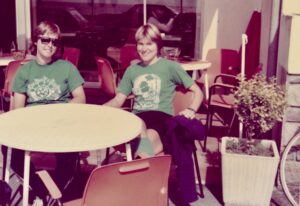
By the time we finally got off it was a ridiculous 5:30 PM, and we were highwired with tea. We traveled just enough distance to be far away from anything useful, when BOTH Perry’s and my bikes started having mechanical issues. The usual — cranky cranks, shiftless shifts, derailed derailleurs, brakeless brakes.
So, now, we were standing in the middle of now-where? and now-what? We figured that all the banging around the bikes on the train might have had initiated our current problems, exacerbated by the damp, and the rough road conditions. I looked at our soggy map, and determined we were probably within two miles from Battle Abbey. There we would attempt repairs, instead of on the road with nightfall approaching.
At last we coaxed and finally pushed our bikes into the darkening, cobblestoned lanes of the place where William the Conqueror kicked Brit butt in the Battle of Hastings. The first possible civilized stop was a classic Tudor pub called “The Squirrel.” We both had our first laugh of the day when I asked, “What do you say we take a few shots at the squirrel?” followed by Perry’s rejoinder, “Only if he’s chock full o’nuts.”
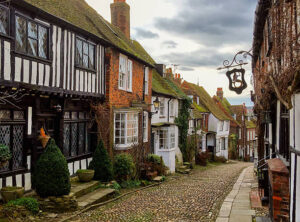
Gentleman or highwayman?
Under a lamppost, in front of The Squirrel, we pulled out our miniscule tool kits and attempted to resuscitate our bikes. We heard a “clop, clop, clop” on the cobblestones. A large black horse emerged into our slight circle of lamplight. It took a moment to realize the horse was followed by a short Victorian-delicate carriage, driven by a gentleman. The tall, dark and handsome gentleman introduced himself as Maurice, and leapt nimbly down from the carriage seat. Although vintage-dressed and in cape and tall boots, he bent down and began helping Perry adjust her muddy brake cables, and then my unsettled wheel. With bikes repaired, the three of us went inside the cozy inn and happily had something to eat. Maurice, hearing of our travels and travails, kindly offered us to pitch our tent in his fields, “just down the road a piece.”
After our traditional pub dinner of heavily-battered cod, English peas, chips, and too many Guinnesses (Guinni?) and ales, we mounted our bikes to follow his marvelous carriage down the moonlit road. The road was long and steep, and I rather wished I was riding in the carriage instead of on my bike. However, we were in true beautiful English countryside, highlighted by the now wind-gust-cleared sky, except for a distant cloud, and the rising full, full Harvest Moon. Maurice slowed and turned down a narrow, tree-lined, rutted and mud-puddled lane. The lane soon turned into a steep steep downhill.
My enchanted mood curdled when Perry asked, “Carolyn, remember that spooky poem, “The Highwayman”? In her now-patented “scare-off-the-serial-tent-murderer” voice, she sang to me an altered Noyce:
Over the cobbles he clattered and clashed in the dark inn-yard.
The wind was a torrent of darkness among the gusty trees.
The moon was a ghostly galleon tossed upon cloudy seas.
The road was a ribbon of moonlight over the purple moor,
And the highwayman came riding—
Then look for me by moonlight,
Watch for me by moonlight,
I’ll come for thee by moonlight, though hell should bar the way.
Now I’m spooked. I’m thinking, I hope to God that nothing bad happens.
Suddenly, for some reason, Maurice’s dark horse shied, whinnied, and spooked like a ghost had nipped his tail. What the…? Maurice immediately jumped to the ground, just before the horse took off like a banshee. The lightened carriage bounced behind. Down, down, down. Sparks flew from the hooves. Sudden darkness. That one stupid cloud had covered the moon. The moon cleared. On our bikes we paced Maurice as he ran down the lane after the runaway. Ahead, there was a tight dogleg left.
“Oh, bloody hell. No!” Maurice cried. The horse made the bend. Hooray. Then a crash sounded. We raced faster. Just around the bend we saw the beautiful old carriage flipped on its side with the horse still attached, yet upright. It was a fiasco.
We leaned our bikes together and walked up, as not to spook the horse further. Luckily, Maurice was able to calm the horse, loosen the pole straps, and after his quick examination, rubbing his palms and fingering along the horse, determined that the animal was not seriously injured. However, the carriage was.
Maurice patted the horse’s nose. Then he patted his coat pocket. ”Well, old girl, you bloody thoroughbred, at least I don’t have to shoot you, now do I?”
With that comforting thought, we abandoned the carriage and walked away. We felt badly, wondering if our bicycle derailleur clicks or perhaps Perry’s foreboding poem reaching the horse’s ears, caused the equestrian edginess. We were afraid to ask. Maurice felt badly because, well, it was truly and terribly embarrassing. So embarrassing, that Maurice now invited us to sleep inside his home, instead of camping. Perry whispered to me, that this may have been his less-seductive-sounding plan all-along.
We soldiered on in the moonlit dark, he, walking the horse, we pushing the bikes, the remaining mile uphill to his ranch. There at the house, extended from the oast, the massive, stone castle-turret-like silo with witch’s hat, aimed at the moon. The place had a strange ambiance.
Meanwhile, back at the ranch
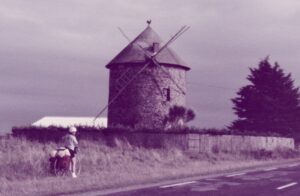
“What is this place again,” I asked.
“This? This is my stud farm.”
Perry couldn’t stifle her snicker.
Maurice led is into the sparsely furnished, but thematically appropriate, home, with heavy oak beams. Maurice proffered a nightcap. We declined. Maurice encouraged “just a thimble-full” of Scotch. We demurred. “Single-malt. From the Isle of Skye.” We acquiesced. I had never drunk Scotch and who could resist an isle in the sky which sounded like a butterscotch malted shake from heaven. Instead it smelled and tasted really strong like oak and pipe tobacco with burnt moss from leprechauns. It was unlike anything I’d ever put in mouth and soooo tasty.
In front of the studly stone fireplace fire, we sipped, feeling the soothing warmth inside and out. Apparently ”thimble-full” meant a fullish small tumbler sans glace. Followed by refill. And then several refills. A sizable hunting dog, the size of a Baskerville, wandered in.
“What’s your name there boy, boy, good boy?” I said, reaching his dog tag for his name. “What an odd name. Bugger.” The dog lunged practically on my lap to lick my face. “Bugger, off! Bugger, off!”
“Hey, watch your mouth,” Perry laughed, choking on her drink.
“Ha, ha, funny.” I babbled, “This Scotch is really gootch. Really warmth.” I gave Bugger a big hug as Maurice chuckled, watching us with bemused interest.
Perry gave me her askew look, aimed to Maurice. I know that look well, she means—oh, oh, here it comes, go to orange alert.
To our relief, it didn’t come. No clumsy innuendo. No lingering hand on the fourth refill. No friendly pat on the thigh. No “spilled” drink on the breast. No offer of, girls, please, take my bed, I insist. Maurice remained a perfect gentleman. We were shown upstairs to our aforementioned, horrible bed from hell. Everything basically worked out. Until the strange and disgusting events which would unfold like paper dolls the next morning.
The pudding thickens
A cockerel crowed. The thing sounded like it was either having sex or dying on our windowsill. Maybe both. My head hurt. Looking at Perry’s scrunched face an inch away made me dizzy. Perry and I were crammed together in the bottom of a bed soft taco. The sunbeam blasted in through the uncovered window right on our faces. We rolled over, synchronized together, pulling the single pillow over, but shortly were awoken by a trembler, then an earthquake. For a moment, I thought I was back in San Francisco. Actually, a strong, buxom woman was in our room, towering over us and shaking our flimsy taco. We stared at her groggily.
“What!” Perry mumbled. “What? Do you want?” She would have looked irate, but one of her eyelids was crusted down in a butterscotchy wink.
The woman snorted a laugh. “I am the trainer, Leslie. You girls, now you come down to breakfast.” She had a slight but indiscernible accent; Russian gulag-guardish? Leslie cast us reproachful (jealous?) eyes, grunted and left, slamming the heavy plank door.
“Trainer?” Perry wondered, peeling herself away from me. She padded to the window, peered down. “We’re in Rapunzel’s tower.”
Down in the rustic kitchen, a mysterious and unexplained thing occurred. Half-a-dozen women about our age, possibly more attractive, wearing old-fashioned long dresses, were hustling and bustling. The entire scene was utterly peculiar. These young women weren’t like anyone we knew—more out of a Dickens novel or Sweeny Todd.
Leslie, with her cascading curly blonde hair and glowers, was apparently Queen Bee. The women scurried around the enormous cook stove that looked from the Great War. And the stove was on fire. Perry and I gaped.
“Never seen?” Leslie asked. “Cast iron, porcelain-enameled, able to burn wood, coal or gas. We use mostly the wood.”
“Practical. Where’s the spinning wheel?” Perry joked.
“In work shed,” Leslie joked not. She asked us where we were going, when we were leaving. She encouraged us to leave soon to avoid the “bit of bother with the weather.”
I wondered if she meant us—under the weather, that is. Three sturdy black cats eyed us, weaving between the legs of the women. One of the women, not looking us in the eyes, thrust steaming coffee mugs toward us. Of course, it was not coffee but still-boiling water with the blackest, bitterest-smelling of tea. Even the mugs were sizzling, and despite our bodies weeping for caffeine, we both set them down.
The women were surprisingly quiet, even subdued; subservient to daunting Leslie, so we followed suit. And curiously, they did not ask us any real questions; considering they were rather stuck out on a ranch and we were, well, adventuring women of the world. Serving platters of food were piling up on the big roughhewn kitchen table. As noted, Perry and I were not fans of the Brit traditional food, particularly their heavy breakfast (especially while bicycling). And less so with hangovers. Stewed anonymous fruit, runny eggs, beans?! (ugh), burnt “black pudding” bangers, scorched ham, plus gobs of butter, mayonnaise and Petromalt (aka Marmite). The combination of odors alone almost did me in.
We assumed that Maurice would come in and we’d all sit on the wooden benches and eat there. Leslie filled up two plates, the other women took settings and our mugs, and all in line formation, followed Leslie into the adjacent dining room. Oh, OK, we’ll all eat in there. We followed. The long antique dining table was then set only for two, at each end.
“There. Then, guests, enjoy your fry-up,” Leslie ordered.
“We’ll wait for you folks and Maurice,” I said.
“We eat in kitchen. This room for special guests.” They all filed out and shut the door.
Other than Leslie stating that this was one of Maurice’s stud farms (had he others?), she had given no introduction nor account of who the young women were, why they were there, or what kind of place this really was. Brothel? Harem? Cult? Religious? Retreat? Home for wayward girls? Another Roadside Attraction? We were too embarrassed to ask the girls, under the observant Leslie. Mysterious Maurice was still nowhere in sight.
“What the…?” I asked.
Perry leaned in. “This Henry the Eighth breakfast?” she whispered. “Only can mean one thing.”
“What?”
“That oven?”
“Yes…”
“They’re going to Hansel & Gretel us.”
“Oh my god!”
“Pretend to eat and fatten up until we figure out a plan.”
We disguised our disgust and picked and poked with more show than swallow in case we were under observation by Wicked Witch Leslie or her flying monkeys.
Bugger wandered in through the other doorway toward us. Perry smiled. She had previously told me how, when younger, at dinner, she would sneak her family’s Irish Setter, Willie Mays (yes, named after the famed SF Giants star), her most loathed food (broccoli, peas) under the table. She performed her sleight of hand now with Bugger. I followed suit, dropping food to the floor, and stuffing some in my napkin, to shake out later.
“We have to get out of this place. Let’s go Bugger. Wanna’ go out? Go out.”
We followed Bugger to sneak out the front door, where he chased another hound off. There, under the open-air porch, where we had left our bikes, we packed on our panniers as fast as we could as Perry reprised “The Highwayman”:
He did not come in the dawning. He did not come at noon—
Right on cue, we heard a whistled tune, and Maurice rode up on a workhorse, pulling his battered, wobbling carriage. Dismounting with a leap (that man could leap), the gentleman flourished a bow, smiled. “Departing us so soon?”
We mumbled something about weather, time tables, posting postcards.
“Join me for fry up, at least.”
We explained that we had already fry uped…
Maurice looked past us. Leslie was striding to the nearby shed or the stable. He frowned toward her. More of a scowl, really.
…and that we had urgent appointments with important people…notable persons…
His face changed and he smiled at us. “Well, if you must push on…”
Still finishing each other’s sentences, we thanked him for the lodging, the breakfast, and profusely for being such a gentleman, rescuing us and taking time to fix our bikes. Maurice, preserving his image of the perfect gentleman, bowed, bid us adieu and good luck, and off we pedaled…
A mere thirty feet. A flock of geese ran honking and flapping and snapping all around us.
“Farm alarm. Guard geese. Don’t look them in the eye,” Perry warned.
Threading through the angry birds, they finally gave up the chase, and we pedaled faster.
A mere hundred yards. A hundred yards down around a curve in the road we had bike problems. Again. Perry’s front wheel was wobbly. My front brakes were mush. Under a stand of ash trees, we spied a decrepit lean-to. As we rolled from the lane, Perry’s wheel jammed into the bike frame. Perry cursed. She pointed at her front axle. It was actually bent! How did that happen?
“Sabotage?” Perry whispered.
That had not occurred to me. My eyes widened.
“Go look in that shed,” she said. “See if there are a bunch of broken-down bicycles.”
I couldn’t tell if she was kidding or not. I shivered. Of course, I did not go look in the shed; most likely filled with chains and chainsaws and beartraps, oh my. But we did hurry our repairs. Perry dumped out her tool kit and managed to pliers-out her axel. She impressed me by placing it on the stone floor, laying a brick on it, and standing on it. She eyed it, slid the thing back in, but then struggled for minutes with the tightening.
Tlot-tlot, Tlot-tlot, Tlot-tlot… Who should come riding by?
Leslie. Leslie in full equestrian outfit, boots and helmet, riding crop twirling on her wrist, on a massive thoroughbred horse, looking like a ten-foot-tall Central Park mounted police. A ways behind, rode five of the breakfast women, mounted on lesser steeds. Leslie’s posse. Just out for a morning ride? Ensuring our departure? Rounding us up back to the stable?
We crouched. Luckily, Leslie didn’t see us. She turned her horse, jumped a ditch, and led her posse across a field. We let out our held breath.
Drip, drip, drizzle, rain, pour. And, to apparently shelter from the first of several cloudbursts. Wonderful.
We headed out, keeping our eyes peeled for a Leslie ambush, hiding spots, and glancing over our shoulders. Soon we took the bend of last night’s crash, cautious of any remnants. Then, we were on the road again, pedaling fast and hard.
Ferrytales
Through the backroads, with a crash-defying axel, heavy panniers and the headwind, we made a Mr. Toad’s Wild Ride of 26 miles, trying to maintain a 15 MPH average. Perry, a biking veteran, who had recently ridden 2,000 miles down the West Coast, recited Murphy’s Law of Bicycle Touring: “There always will be a headwind, no matter which direction you ride.” And rain goes without saying. We glided along, bicycles seemingly forgetting their illnesses, miraculously with no further mechanical misadventures, mishaps, or missing persons reports. Around three PM we made a pit stop to dry off and eat lunch, feeling victorious. We leaned one of our bikes against an old parked car and when the owners came back we got totally bawled out for “putting a bleedin’ scratch in our p’int.” Perry said, Sorry. Which one?
That evening we made it to Lewes, pronounced “Lewis”, where a bike shop supplied Perry with a new axel. We continued to be pleasantly surprised by abounding greenery, quaint stone or brick farmhouses and a couple of fantastic rainbows. The most picturesque of the little bergs was Glynde. It fell down the hillside into a valley, which, on Sunday afternoon was the center of community activity. The focus: an interminable + indecipherable cricket match. From the heart of the valley, houses rolled back and wound around to the crest of a hill. We ate in an Indian restaurant (bless India for civilizing the English diet) and plotted our ride through Brighton to Portsmouth, and the forewarned rough ferry ride across the Channel to St. Malo, France. A pleasant man, walking along swinging his umbrella suggested a B&B on the edge of town with a cutesy (no surprise) name — “The Snowdrop.” The Snowdrop’s highlight was the comfy beds (finally) with the fluffiest-ever goose down comforters.
That night, I was the one dreaming—
I was Dorothy, biking with my best friend through the land of the Munchkins, our tin can bicycles rusting in the rain, the tiny fairytale houses scattered throughout the countryside, a quirky, mildly sinister gentleman pulling up in horse-drawn buggy and rescuing us, and, most of all, the white, picketed road signs directing one this way and that, to the cleverest sounding little towns—Windmill Hill, Horsebridge, Glynde…
End

Note:
Perry King is the Senior Editor of this magazine and Carolyn Adams was our original book reviewer. Perry and Carolyn remain good friends. Perry has converted to a Specialized E-bike and Carolyn has taken to horses and horse cart racing.